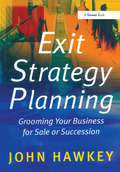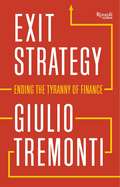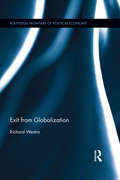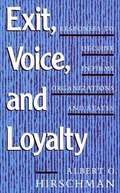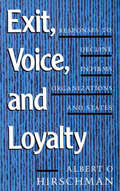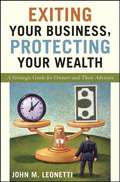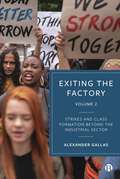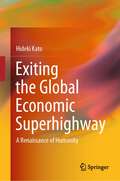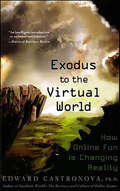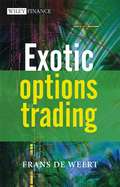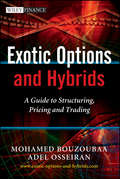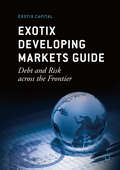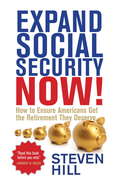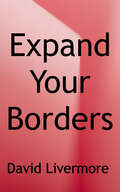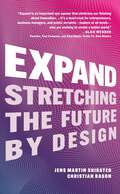- Table View
- List View
Exit Strategy (A)
by Clayton Rose Justine LelchukJeff Brown wondered whether now was the right time to call his boss, and friend, Bernard Tubiana. Brown was a rising star at Deloitte Consulting and three weeks into an important project for Aflac. He was about to receive an offer from Aflac's major competitor, Colonial Life, to become its Chief Marketing Officer.
Exit Strategy Planning: Grooming Your Business for Sale or Succession
by John HawkeyFor private business owners, managing a successful exit from their business is one of the most important events in their business lives. This book shows you how to do so with the minimum of fuss and maximum return. It is unique because the author writes from the owner's point of view, bringing together in one place all you need to know about planning this complex process. Exit Strategy Planning emphasises the need to place exit planning on a firm foundation, with taxation planning and business continuity planning providing the basis to ensure a smooth transition that will yield the maximum return. The first three parts of the book ('Laying the Foundations', 'Choosing your Exit Strategy' and 'Preparing and Implementing your Plans') present a best practice approach to this complex subject. Here the book highlights the importance of planning, often several years in advance, and explains the need to make the business 'investor ready' by identifying and removing impediments to sale. Part 3 culminates in a step-by-step guide to producing and implementing your Master Exit Strategy Plan. Following on from this the extensive appendices in Part 4 discuss in detail each of the exit options open to you (many of which you have probably never considered) and show how to choose the optimum exit route. Exit Strategy Planning is a book that will do more than save you time and money now and in the future; it will help you to maximise on what may well be a lifetime's investment.
Exit Strategy: Ending the Tyranny of Finance
by Giulio TremontiFrom Italy's former minister of economy and finance, a provocative and galvanizing jeremiad on the Euro crisis and the global economic status quo. As Europe's debt crisis persists and the aftershocks of the 2008 collapse hinder recovery across the globe, Giulio Tremonti underscores the dangers that unchecked financial markets pose to democracy, and explains what nations must do to protect their autonomy. Condemning what he calls "marketism"--an insidious ideology that puts the speculative financial market above all else--Tremonti bemoans a world in which finance, not governments, sets the rules and, as a result, determines political discourse. But when finance fails, it is the people who must pay the price, and not just economically. An instant and enduring bestseller in Italy, Exit Strategy calls for sweeping changes in both policy and mindset. Candid and critical as few politicians have been in the aftermath of the crisis, Tremonti breaks down the systemic failures of global finance and proposes a "New Alliance" between citizens and governments to free politics from the thrall of the financial markets, and put the people themselves back in control.
Exit Zero: Family and Class in Postindustrial Chicago
by Christine J. WalleyIn 1980, Christine J. Walley¿s world was turned upside down when the steel mill in Southeast Chicago where her father worked abruptly closed. In the ensuing years, ninety thousand other area residents would also lose their jobs in the mills¿just one example of the vast scale of deindustrialization occurring across the United States. The disruption of this event propelled Walley into a career as a cultural anthropologist, and now, in Exit Zero, she brings her anthropological perspective home, examining the fate of her family and that of blue-collar America at large. Interweaving personal narratives and family photos with a nuanced assessment of the social impacts of deindustrialization, Exit Zero is one part memoir and one part ethnography¿ providing a much-needed female and familial perspective on cultures of labor and their decline. Through vivid accounts of her family¿s struggles and her own upward mobility, Walley reveals the social landscapes of America¿s industrial fallout, navigating complex tensions among class, labor, economy, and environment. Unsatisfied with the notion that her family¿s turmoil was inevitable in the ever-forward progress of the United States, she provides a fresh and important counternarrative that gives a new voice to the many Americans whose distress resulting from deindustrialization has too often been ignored. This book is part of a project that also includes a documentary film and interactive website. For more information, and the chance to share your own stories, photos, and artefacts regarding the history of Southeast Chicago, please visit: http://www. exitzeroproject. org/
Exit from Globalization (Routledge Frontiers of Political Economy)
by Richard WestraExit from Globalization moves from theory to practice: from questions of where incorrigible knowledge of substantive economic life derives and how that knowledge is put towards making a progressive, redistributive, eco-sustainable future of human flourishing. Westra discards at the outset views that the root of current economic ills is the old devil we know, capitalism. Rather, he maintains the neoliberal decades spawned a "Merchant of Venice" economic excrescence bent upon expropriation and rent seeking which will scrape all the flesh from the bones of humanity if not stopped dead in its tracks. En route to providing a viable design for the human future in line with transformatory demands of socialists and Greens, Westra exorcizes both Soviet demons and ghosts of neoliberal ideologues past which lent support to the position that there is no alternative to "the market". Exit from Globalization shows in a clear and compelling fashion that while debates over the possibility of another, potentially socialist, world swirl around this or that grand society-wide scheme, the fact is that creative future directed thinking has at its disposal several economic principles that transformatory actors may choose from and combine in various ways to remake human economic life. The book concludes with an examination of the various social constituencies currently supporting radical change and explores the narrowing pathways to bring change about.
Exit, Voice, and Loyalty: Responses to Decline in Firms, Organizations, and States
by Albert O. HirschmanAn innovator in contemporary thought on economic and political development looks here at decline rather than growth. Albert O. Hirschman makes a basic distinction between alternative ways of reacting to deterioration in business firms and, in general, to dissatisfaction with organizations: one-exit-is for the member to quit the organization or for the customer to switch to the competing product, and the other-voice-is for members or customers to agitate and exert influence for change from within. The efficiency of the competitive mechanism, with its total reliance on exit, is questioned for certain important situations. As exit often undercuts voice while being unable to counteract decline, loyalty is seen in the function of retarding exit and of permitting voice to play its proper role. The interplay of the three concepts turns out to illuminate a wide range of economic, social, and political phenomena. As the author states in the preface, having found my own unifying way of looking at issues as diverse as competition and the two-party system, divorce and the American character, black power and the failure of 'unhappy' top officials to resign over Vietnam, I decided to let myself go a little.
Exit, Voice, and Loyalty: Responses to Decline in Firms, Organizations, and States
by Albert O. HirschmanAn innovator in contemporary thought on economic and political development looks here at decline rather than growth. Albert O. Hirschman makes a basic distinction between alternative ways of reacting to deterioration in business firms and, in general, to dissatisfaction with organizations: one, “exit,” is for the member to quit the organization or for the customer to switch to the competing product, and the other, “voice,” is for members or customers to agitate and exert influence for change “from within.” The efficiency of the competitive mechanism, with its total reliance on exit, is questioned for certain important situations. As exit often undercuts voice while being unable to counteract decline, loyalty is seen in the function of retarding exit and of permitting voice to play its proper role. The interplay of the three concepts turns out to illuminate a wide range of economic, social, and political phenomena. As the author states in the preface, “having found my own unifying way of looking at issues as diverse as competition and the two-party system, divorce and the American character, black power and the failure of ‘unhappy’ top officials to resign over Vietnam, I decided to let myself go a little.”
Exiting Your Business, Protecting Your Wealth
by John M. LeonettiWritten by John Leonetti--attorney, wealth manager, merger and acquisition associate, and fellow exiting business owner in his own right--Exiting Your Business, Protecting Your Wealth will guide you in thoughtfully planning out your exit options as well as helping you analyze your financial and mental readiness for your business exit. Easy to follow and essential for every business owner, this guide reveals how to establish an exit strategy plan that is in harmony with your goals.
Exiting the Factory (Volume 1): Strikes and Class Formation beyond the Industrial Sector
by Alexander GallasIn this important book, Gallas asks what strikes in non-industrial sectors mean for class formation, a critical question which has largely been unaddressed by the current literature on global labour unrest. A mapping of strikes around the world and case studies from Germany, Britain and Spain cast new light on class relations, struggles around waged and unwaged work and labour movements in contemporary capitalism to bring class theory back to labour studies. This is a valuable resource for academics and students of employment relations, sociology and politics.
Exiting the Factory (Volume 2): Strikes and Class Formation beyond the Industrial Sector
by Alexander GallasIn this important book, Gallas asks what strikes in non-industrial sectors mean for class formation, a critical question which has been largely unaddressed by the current literature on global labour unrest. A mapping of strikes around the world and case studies from Germany, Britain and Spain cast new light on class relations, struggles around waged and unwaged work and labour movements in contemporary capitalism to bring class theory back to labour studies. This is a valuable resource for academics and students of employment relations, sociology and politics. This second volume focuses on empirical strike research.
Exiting the Global Economic Superhighway: A Renaissance of Humanity
by Hideki KatoThis book tackles global economic and social issues from a perspective that may seem obvious but which no author has yet taken: that we humans are living beings. In today’s artificially globalized world, we have increasingly lost sight of our original humanity. Despite the serious environmental, social, and political problems we are facing, we cannot stop focusing on economic growth, efficiency, and liberalization. In doing so, we continue to make the world “slicker” and more unstable. This book identifies these conventional values and ways of thinking as the root cause underlying many of today’s challenges, and it offers the perspective of a “bumpier” and more organic human existence that provides a greater sense of traction and stability. The book begins with a discussion of global systems and structures, proposing a “world with two systems” to limit the effects of artificially constructed globalization. The second part examines the modern welfare state, outlining a process to revive democracy and social capital by making social issues the business of everyday citizens. The third and final part focuses on human well-being, emphasizing physicality and the Japanese concept of kata as keys to restoring our humanity. Rather than searching for specific solutions through specialized knowledge, this book makes use of the author’s broad perspective acquired through many years of public policy research and reform. It asserts that knowledge should be acquired through hands-on experience and in studies based on real-world situations, involving people at the forefront of society’s challenges, whether politicians, businesspeople, scientists, craftspeople, or farmers. In both its analysis of humanity’s problems and the solutions it offers, this book takes an entirely new yet utterly natural approach to steering humanity off the global economic superhighway.
Exodus to the Virtual World: How Online Fun Is Changing Reality
by Edward CastronovaVirtual worlds have exploded out of online game culture and now capture the attention of millions of ordinary people: husbands, wives, fathers, mothers, workers, retirees. Devoting dozens of hours each week to massively multiplayer virtual reality environments (like World of Warcraft and Second Life), these millions are the start of an exodus into the refuge of fantasy, where they experience life under a new social, political, and economic order built around fun. Given the choice between a fantasy world and the real world, how many of us would choose reality? Exodus to the Virtual World explains the growing migration into virtual reality, and how it will change the way we live--both in fantasy worlds and in the real one.
Exonerated: The Failed Takedown of President Donald Trump by the Swamp
by Dan BonginoFrom the New York Times bestselling author of SPYGATE <P><P>An explosive, whistle-blowing expose, Exonerated: The Failed Takedown of Donald Trump by the Swamp reveals how Deep State actors relied on a cynical plug-and-play template to manufacture the now-discredited Russiagate scandal. <P><P>With the cutting analysis and insight he exhibited in his blockbuster bestseller Spygate: The Attempted Sabotage of Donald J. Trump, Fox News contributor Bongino exposes who masterminded the dangerous playbook to take down Trump, their motives, and how a plan filled with faked allegations backfired—forcing investigators to up the ante and hide their missteps and half-truths in a desperate effort to prove a collusion case that never happened. <P><P>The result? The misguided multimillion Mueller investigation that tore the nation apart, tried to destabilize the presidency and led, as the world now knows, to nowhere! <P><P><b>A New York Times Bestseller</b>
Exoskelette in der Intralogistik: Erfolgreich implementieren und Prozesse optimieren
by Martin Lucas Carsten Feldmann Victor KaupeExoskelette sind mechanische Strukturen, die am menschlichen Körper getragen werden, um das Muskel-Skelett-System des Trägers bei bestimmten Bewegungen und Haltungen zu unterstützen. Sie stellen für die Intralogistik eine innovative Technologie dar. Durch verbesserte Ergonomie haben Exoskelette das Potenzial sowohl den gesundheitlichen Herausforderungen einer alternden Arbeitnehmerschaft zu begegnen als auch die Prozesseffizienz zu erhöhen. Dieses Buch stellt einen praxisorientierten Leitfaden vor, mit dem Unternehmen Exoskelette erfolgreich in der Intralogistik einführen können. Das Vorgehensmodell ist in einen schrittweisen Prozess gegliedert, der Projekte von der ersten Idee bis zur Realisierung unterstützt. Zwei begleitende Fallstudien aus der Möbel- und Beschichtungs-/Lackindustrie zeigen Erfolgsfaktoren und erläutern die praktische Umsetzung anhand von Checklisten.
Exotic Interest Rate Swaps: Snowballs in Portugal
by Boris Vallee Patrick Augustin Philippe RichThis case explores a complex swap transaction implemented by Metro do Porto in 2007. It represents an opportunity to study fixed income derivative instruments, such as plain-vanilla swaps and structured swaps, as well as understand the opportunities and challenges of using innovative financial instruments. The public sector setting allows to discuss the political economy implications of such transactions.
Exotic Options Trading
by Frans De WeertWritten by an experienced trader and consultant, Frans de Weert's Exotic Options Trading offers a risk-focused approach to the pricing of exotic options. By giving readers the necessary tools to understand exotic options, this book serves as a manual to equip the reader with the skills to price and risk manage the most common and the most complex exotic options.De Weert begins by explaining the risks associated with trading an exotic option before dissecting these risks through a detailed analysis of the actual economics and Greeks rather than solely stating the mathematical formulae. The book limits the use of mathematics to explain exotic options from an economic and risk perspective by means of real life examples leading to a practical interpretation of the mathematical pricing formulae.The book covers conventional options, digital options, barrier options, cliquets, quanto options, outperformance options and variance swaps, and explains difficult concepts in simple terms, with a practical approach that gives the reader a full understanding of every aspect of each exotic option. The book also discusses structured notes with exotic options embedded in them, such as reverse convertibles, callable and puttable reverse convertibles and autocallables and shows the rationale behind these structures and their associated risks.For each exotic option, the author makes clear why there is an investor demand; explains where the risks lie and how this affects the actual pricing; shows how best to hedge any vega or gamma exposure embedded in the exotic option and discusses the skew exposure.By explaining the practical implications for every exotic option and how it affects the price, in addition to the necessary mathematical derivations and tools for pricing exotic options, Exotic Options Trading removes the mystique surrounding exotic options in order to give the reader a full understanding of every aspect of each exotic option, creating a useable tool for dealing with exotic options in practice."Although exotic options are not a new subject in finance, the coverage traditionally afforded by many texts is either too high level or overly mathematical. De Weert's exceptional text fills this gap superbly. It is a rigorous treatment of a number of exotic structures and includes numerous examples to clearly illustrate the principles. What makes this book unique is that it manages to strike a fantastic balance between the theory and actual trading practice. Although it may be something of an overused phrase to describe this book as compulsory reading, I can assure any reader they will not be disappointed."--Neil Schofield, Training Consultant and author of Commodity Derivatives: Markets and Applications"Exotic Options Trading does an excellent job in providing a succinct and exhaustive overview of exotic options. The real edge of this book is that it explains exotic options from a risk and economical perspective and provides a clear link to the actual profit and pricing formulae. In short, a must read for anyone who wants to get deep insights into exotic options and start trading them profitably."--Arturo Bignardi
Exotic Options and Hybrids: A Guide to Structuring, Pricing and Trading
by Mohamed Bouzoubaa Adel OsseiranThe recent financial crisis brought to light many of the misunderstandings and misuses of exotic derivatives. With market participants on both the buy and sell-side having been found guilty of not understanding the products they were dealing with, never before has there been a greater need for clarification and explanation. Exotic Options and Hybrids is a practical guide to structuring, pricing and hedging complex exotic options and hybrid derivatives that will serve readers through the recent crisis, the road to recovery, the next bull market and beyond. Written by experienced practitioners, it focuses on the three main parts of a derivative’s life: the structuring of a product, its pricing and its hedging. Divided into four parts, the book covers a multitude of structures, encompassing many of the most up-to-date and promising products from exotic equity derivatives and structured notes to hybrid derivatives and dynamic strategies. Based on a realistic setting from the heart of the business, inside a derivatives operation, the practical and intuitive discussions of these aspects make these exotic concepts truly accessible. Adoptions of real trades are examined in detail, and all of the numerous examples are carefully selected so as to highlight interesting and significant aspects of the business. The introduction of payoff structures is accompanied by scenario analysis, diagrams and lifelike sample term sheets. Readers learn how to spot where the risks lie to pave the way for sound valuation and hedging of such products. There are also questions and accompanying discussions dispersed in the text, each exploited to illustrate one or more concepts from the context in which they are set. The applications, the strengths and the limitations of various models are highlighted, in relevance to the products and their risks, rather than the model implementations. Models are de-mystified in separately dedicated sections, but their implications are alluded to throughout the book in an intuitive and non-mathematical manner. By discussing exotic options and hybrids in a practical, non-mathematical and highly intuitive setting, this book will blast through the misunderstanding of exotic derivatives, enabling practitioners to fully understand and correctly structure, price and hedge theses products effectively, and stand strong as the only book in its class to make these “exotic” concepts truly accessible.
Exotix Developing Markets Guide: Debt and Risk across the Frontier
by Exotix CapitalWelcome to the latest edition of the Exotix Capital Developing Markets Guide. This is the sixth edition, the previous one having been published in February 2011 when the concept of investing in frontier economies was beginning to gain traction again after being derailed by the global financial crisis. A lot has happened since then. This guide is written for the serious frontier market investor, policymaker or academic analyst who is looking to maximise returns, improve policymaking or advance research through superior knowledge. We provide analysis and outlooks for 42 frontier economies along with detailed descriptions of their debt histories and restructuring experiences, and with the main investable instruments in the hard currency sovereign and corporate space in each. We aim to give our clients a convenient reference point to check details on loans and illiquid bonds and include as many frontier markets, illiquid instruments, nonperforming or restructured bonds and loans as possible.
Expand Social Security Now!
by Steven HillWhy Social Security is not only sustainable but should be substantially expandedSocial Security is bankrupting us. It's outdated. It's a Ponzi scheme. It's stealing from young people. These are some of the biggest myths and lies about one of the most successful programs in our nation's history. Three-quarters of Americans depend heavily on Social Security in their elderly years and nearly half would be living in poverty without it. But as important and popular as it is, Social Security has become a political football. A well-financed campaign--supported by conservatives, special interest groups, and even leading Democrats--has lobbied for cuts and significant "entitlement reform," falsely proclaiming that Social Security is going broke. Policy expert Steven Hill argues that Social Security should not only be defended, it should be substantially expanded. Here he proposes how we can double the monthly benefit and how to pay for it by closing many of the tax loopholes and deductions that disproportionately favor the wealthy few.From the Trade Paperback edition.
Expand Your Borders: Discover Ten Cultural Clusters
by David LivermoreIn bestsellers such as Leading with Cultural Intelligence and Serving with Eyes Wide Open, David Livermore has taught readers how to develop their cultural intelligence, or CQ—an overall capability for working and relating effectively across cultures. <p><p>Now, in Expand Your Borders, you have a compilation of the most important information for improving your CQ Knowledge—your understanding of key cultural similarities and differences. Rather than rehashing the overused stereotypes of Indians versus Brits or Koreans vs. Brazilians, this book provides you with a macro comparison of the most significant cultural similarities and differences you’ll encounter as you travel across today’s multicultural environment—at home and abroad. <p><p>Expand Your Borders takes you on a whirlwind tour across ten cultural clusters around the world. You’ll see why dressing with too much bling could get you in trouble in Nordic Europe. You’ll learn the story behind chopsticks in Confucian Asia, and hear why Livermore needed his own nurse after surviving a serious dune buggy accident in Brazil. <p><p>Rooted in academic research and brought to life with stories and best practices, this is a book you can read once for a quick overview, and then return to as needed when preparing for an overseas trip or reflecting on a recent cross-cultural encounter. And as you learn about the ten cultural clusters, you can improve the quality and enjoyment of your cross-cultural travels, work, and relationships!
Expand: Stretching the Future By Design
by Christian Bason Jens Martin SkibstedToday, it can seem as if the world has nothing but problems. And more than ever the boundaries of those problems are expanding in terms of the speed, scale, and impact by which they can alter business conditions, public governance, entire societies, the health of our planet, and the quality of our lives. Meeting these growing challenges requires ambitious new ways of designing solutions. With Expand: Stretching the Future By Design, authors Jens Martin Skibsted, a multiple-award winning designer, entrepreneur, and design philosopher, and Christian Bason, political scientist and CEO of the Danish Design Centre, take readers beyond &“design thinking&” to challenge current habits and carve out new space for more sustainable innovation. From transforming the ways we do business and reimagining health care, to creating planet-restoring housing and humanizing our digital lives in an age of AI, Expand explores how expansive thinking across six key areas—time, proximity, value, life, dimensions, and sectors—can provide radical, useful solutions to a whole host of current problems around the globe. With powerful real-world examples, the book challenges our freewheeling belief in technological determinism and its insensitivity toward ethics, humanity, and the environment. Expand is the first book to not just critique design thinking, but welcome it as a starting point for an ambitious, wide-ranging tale of how to expand and think beyond it. The best way to predict the future is to design it. Expand is the book that shows us how.
Expanding Access to Health Care: A Management Approach (Transformational Trends In Governance And Democracy Ser.)
by Terry F. Buss Paul N. Van de WaterThe U.S. health care system faces well-known problems: 47 million people without health insurance, rapidly rising costs that consume 16 percent of the country's economic output, and widely uneven quality of care. Even many people with coverage are experiencing serious problems paying for the rapidly rising costs of health care and insurance.This book - a joint product of the National Academy of Public Administration and the National Academy of Social Science - undertakes a sweeping analysis of the management and administrative issues that arise in expanding health care coverage. The book identifies the core administrative functions that need to be performed in assuring access to health coverage, describes how these functions are performed at present and under proposed alternatives, draws lessons from experience in the U.S. and abroad, and assesses suggested administrative approaches designed to facilitate the improvement and expansion of health care coverage.Adequate health care is one of today's most crucial domestic policy concerns. "Expanding Access to Health Care" is designed to bring together in one place some of the best thinking on the subject, not as an exercise in advocacy, but rather to lay out the issues in a balanced way so that policymakers, researchers, and citizens can better understand the complex details of health care reform.
Expanding Class: Power and Everyday Politics in Industrial Communities, The Netherlands 1850–1950
by Don KalbExpanding Class is the study and story of industrial class relations in North Brabant, a Catholic province of The Netherlands, over a hundred-year period. In examining the lives of workers in one of Europe's more idiosyncratic industrial regions, Don Kalb affirms the utility of class analysis while responding to the cultural critics who have encouraged a movement away from this focus in labor history. In so doing, Expanding Class advances an interdisciplinary historical anthropology of working-class formation. Basing his analysis on oral as well as archival sources, Kalb reveals a dynamic relationship between capitalist industrialization, locality, and cultural class identities.Expanding Class compares Brabant's quaint central shoemaking district to its electrical boomtown Eindhoven, home of the enormous Philips Corporation. It introduces the concept of "flexible familism," a sociological phenomenon in which family daughters were employed to facilitate a cheap and ample labor force. Industrialists manipulated and fostered flexible familism to ensure the discipline and loyalty of the working-class community. By using the industrial Netherlands as a paradigm, Kalb reveals new and productive ways to examine class construction and the development of labor history in other countries over the past thirty years, steering a path between the two schools of thought--cultural and economic--that have dominated labor history discussions in recent years.

